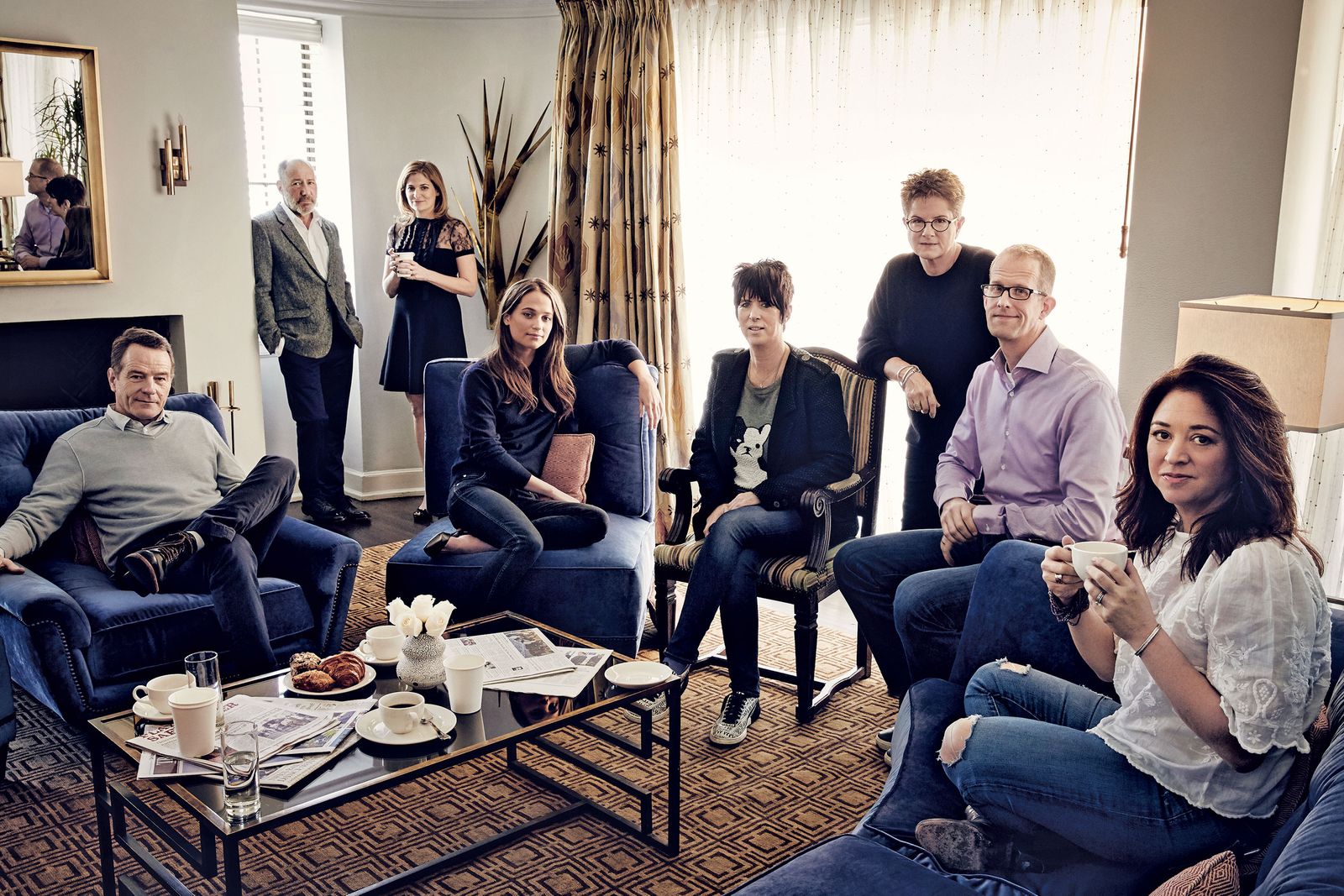
Seventy-two hours after this year’s Academy Award nominations were announced, we convened eight nominees to discuss what was on their minds. And there was a lot! From an upstart ingenue like Alicia Vikander, tapped for Best Supporting Actress for The Danish Girl, to a veteran producer like Steve Golin, who has two films (Spotlight and The Revenant) competing for Best Picture; from a writer like Andrea Berloff, who co-scripted the unexpected blockbuster Straight Outta Compton, to documentary director Liz Garbus, nominated for her defiant and heartbreaking What Happened, Miss Simone?, all the assembled were equally eager to share their insights about the craziness (and necessity) of Oscar campaigning, the omnipresent diversity issue, recent changes to the movie business, and — according to Bryan Cranston — why you have to be ready to win.
Participants:
Alicia Vikander, supporting actress, The Danish Girl
Andrea Berloff, co-writer, Straight Outta Compton
Bryan Cranston, lead actor, Trumbo
Diane Warren, songwriter, “‘Til It Happens to You,” from The Hunting Ground
Liz Garbus, director, What Happened, Miss Simone?
Pete Docter, writer/director, Inside Out
Phyllis Nagy, writer, Carol
Steve Golin, producer, The Revenant and Spotlight
What does this nomination mean to you at this point in your career?
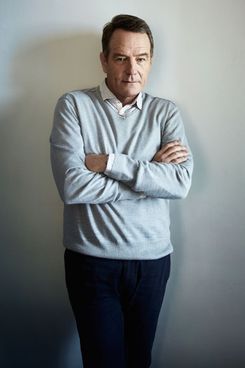
Bryan Cranston: It means a great deal. It’s the first moniker you hear about when you grow up: “Oscar nominee.” I’m just trying to take it all and really be in the moment and see what it feels like, and then accept the ephemeral nature of it. We can celebrate and meet all these really interesting, creative people, and then it goes away — and it should go away — and we go back to work.
How do you compare the culture of the Oscars versus the Emmys?
Cranston: There’s a certain sense of self-congratulatory presence to it. I don’t think anyone pats themselves on the back better than our industry. There is an award for just about everything.
Pete Docter: “The award for the Best Awards Show goes to …” [Laughs.]
Is there now increased pressure on talent and films to win awards?
Steve Golin: Yeah, for sure. There are a lot of elements to this. Obviously, the studios want to win awards. There’s box-office pressure, since if a movie wins certain awards, it becomes more important down the line. And as actors will testify, awards-season publicists will send them to supermarket openings if they let them. There’s no question it’s gotten kind of out of hand.
Docter: Is that true of all films?
Liz Garbus: I can speak to that. I was nominated for an Oscar in 1998 [for The Farm: Angola, USA], and the difference between being there then and being here now is a world apart. Part of it is that there’s more commercial support for documentaries — they are seen as viable movies, as opposed to spinach we are fed. But also, the pressure on me as the director. It was a totally different experience [this year, compared to] 18 years ago.
Diane, you have some perspective on this. You’ve been nominated several times, and your first nod came almost 30 years ago.
Diane Warren: Yeah, I’m a seven-time loser! [Laughs.] I put pressure on myself. I don’t want to be an eight-time loser. It sounds really pathetic!
Andrea Berloff: But it’s not “eight-time loser,” it’s “eight-time nominee”!
Warren: Thursday morning was just as exciting as the first time it ever happened. I mean, think about all the songs that come out, and all the movies. But it’d be nice to win.
Alicia, what does this nomination mean to you? You’ve had a breakthrough year, with a lot of terrific performances in big movies. Does this feel like the culmination of all that?
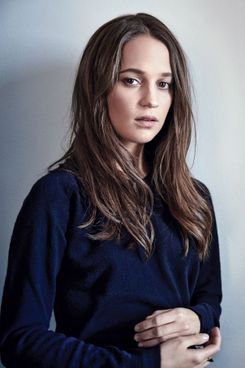
Alicia Vikander: It’s interesting, first of all, to hear about the culture of this. I grew up in Sweden, and I had heard of the Oscar nominations — every year I was up at 3 a.m. by the TV. But the rest of it? I actually came here with A Royal Affair three years ago, a Danish film, and me and the director were running around like, “What is this?” We went to these parties, and we were always the people in the corner. I remember the first time I heard someone in a discussion say the words awards season. I thought it was a joke! Now it’s so interesting to sit here and answer questions about it.
Garbus: One important thing about awards season — and they are two funny words together — is that it does shed a light on what’s happening in the industry. We’ve all heard about the hashtags #OscarsSoWhite and #OscarsSoMale. It’s a reflection of who’s getting jobs in Hollywood, and what they are — what opportunities female directors and actors of color are getting. And so it sheds light on a discussion that shouldn’t just be happening once a year, when awards season happens, but every day — because it’s structural, it’s institutional, and it’s not about the Academy. The Academy is just reflecting a larger truth about what film studios are choosing to promote for awards season. We can all look at Creed as an example of that.
Andrea, why do you think it is that Straight Outta Comptondidn’t make it into the Best Picture field after doing so well at the precursors?
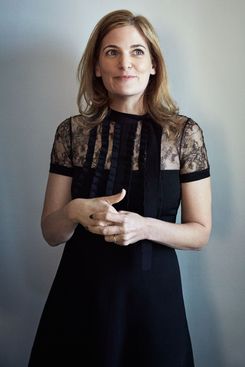
Berloff: I don’t want to attribute it to any one thing because, ultimately, I don’t know why each individual put down on their ballot what they put down. There are a few positives I’d like point out. 2015 was a remarkable year in terms of this conversation. You can’t imagine the amount of diversity events I attended, and that was not happening even five years ago, so the fact that people are even talking about it now is a start. My hope is that this can be used as part of that conversation to see what happens this year and the year after about hiring. That is where it starts. People have to get hired in order for their movies to get made, and in order for their movies to get pushed.
Have people been surprised to learn that the writers of your film are both white? Have you felt that backlash personally?
Berloff: [Pauses.] It’s been … uh, yeah.
Warren: Which is really unfair.
Berloff: It’s been an interesting couple days.
Warren: I mean, who hired you?
Berloff: [Compton producer] Ice Cube hired me. It wasn’t like they were looking for a white woman. And if I may say, 11 percent of movies last year were written by women. So the fact that there are four nominees this year in the writing categories who are women is amazing!
Warren: And the fact that you have to talk about “women writers” and “women directors” — what is that?
Cranston: It’s ridiculous.
Berloff: The fact there are four of us nominated is worth celebrating. And nobody is talking about how awesome that is.
Phyllis, do you feel like people pigeonhole you as a woman writer, and does that affect the sorts of projects they ask you to write?
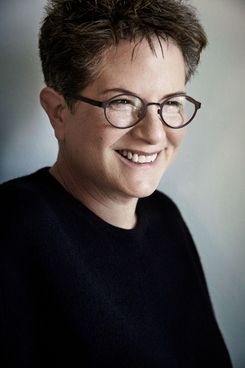
Phyllis Nagy: Not since Thursday. I’m not exaggerating. My phone has been ringing with the kinds of big studio jobs that I wasn’t getting before the nomination. I understand that this is a business, and it operates both artistically and on the financial level, and it is incumbent upon people like me and Andrea to walk into rooms and say, “No, I don’t want to write the movie about the woman giving birth. I want to write the movie about the Mafia.”
There was an outcry, too, that Carol wasn’t nominated for Best Picture and Todd Haynes didn’t make the final five for Best Director. What do you make of that?
Nagy: If there’s a passionate response, I put that down to absolute love for the movie, and that’s great. On the other hand, Carol is nominated for six Oscars, and all of us represent the film in a particular way. It could have swung the other way, and that’s a testament to probably the whimsical nature of ticking boxes off on a ballot. Do I think Todd and the producers deserve to be there? Of course. But we also have to be very proud of what has happened with it. We made a great movie.
Speaking of films that weren’t nominated for Best Picture, Pete, what’s your take on Inside Out missing the cut? While it still got a nomination for Best Animated Film, do you wonder why the Academy didn’t nominate one of Pixar’s most acclaimed films of all time for Best Picture?
Docter: Yeah. A lot of times people talk about that, so, yeah, you do wonder. I think there’s a mind-shift for people when they watch something animated. They think of it in a different category. But most people would be shocked how similar the process is. It’s just stretched out over five years.
Steve, you produced two Best Picture nominees, The Revenantand Spotlight.
Warren: Which are you hoping for? … Don’t answer.
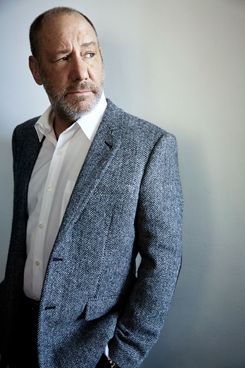
Golin: I have two children, and I love them both. [Laughs.] What can you say about it? Both movies were supposed to happen years ago and didn’t — and now they happen in the same year.
Is it hard to get smaller, more intimate dramas like Spotlightfinanced, especially now that prestige television does that sort of thing so well?
Golin: They were both very difficult to get financed. But irrespective of that, what’s interesting is that in motion pictures right now, drama is a dirty word. If you’re going in and pitching a drama to a studio, it’s a real uphill battle. The problem with these small movies is that the marketing cost is so astronomical.
Cranston: The same cost as doing a larger film.
Golin: That’s right. Sometimes the marketing cost can be three times the budget of the movie. It’s completely upside-down. So you don’t always want that pressure. It was like when [Steven] Soderbergh did Beyond the Candelabra and decided to take that to HBO. With that casting, clearly, he could have gotten it released theatrically. But he decided not to do that, to take the pressure off and to make the movie that he wanted to make. There’s nobody that won’t do cable now. Martin Scorsese’s doing it, Ridley [Scott] did it, [David] Fincher did it. Ironically, we have taken some movies that we’ve developed in the past and turned them into TV shows now, and they’re better. We’re doing The Alienist for cable, as ten hours. Paramount tried to make that as a two-hour movie for about 15 years, and spent God knows how much money. It’s about figuring out what belongs where.
Alicia, you said recently how rare it is that you get to share a scene with another actress, and at this point, you’re being sent a lot of top scripts. Do you keep finding that these big movies have only one notable part for a woman?
Vikander: Yes. I was almost a bit embarrassed when I found myself in Tulip Fever, with Holliday Grainger, and realized while making the scene with her that, in my previous three films where I had a leading role, I had not one line with another woman. I had been so focused and happy with the fact that I had one of those good female roles — they were interesting parts, with complex characters — that I hadn’t even thought about it. I think about the good things, I guess, and then I kind of go, “Oh shit, I need to really look at this, too, because it’s strange.”
Nagy: Yeah, what you say is a real problem.
Vikander: But I read your script [for Carol] two years ago and I thought, Brilliant script. I was like, “Finally.”
Cranston: She’s a little upset she wasn’t cast.
Nagy: For the only time in my life, I’m going to enjoy saying, “I’m just the writer.” [Laughs.] I get it, though. The development people, those are the first scenes they want cut. They say, “Do you really need those scenes between women?”
Do you think they’re saying that to you consciously?
Nagy: I do not think it’s conscious. But I think that because of our cultural conditioning, speaking dramaturgically, the brain just goes to, But where’s the romance, where’s the men? Scenes between women are more often than not deemed to be superfluous. And what it takes to fight that is just taking a deep breath and saying, “This is why it’s necessary,” rather than saying, “Fuck you!”
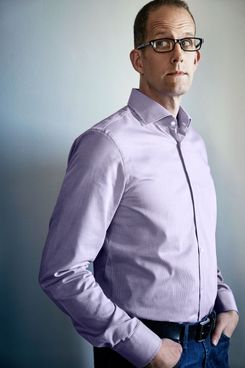
Docter: Even with Inside Out, we talk to a lot of critics who are like, “This is so brave. It’s a film about a girl, and the leads are female.” I’m like, “Really? Why is this something special?” It’s not brave at all. It’s the story.
Pixar is comprised of mostly men in the top positions, and though you’ve put out some films with female protagonists, the bulk of them are about male characters. Are there times at Pixar where you think, We’ve got to go beyond what we consider our default?
Docter: Absolutely. In this case, Inside Out was inspired by watching my daughter grow up. It needed to be truthful to the source. With animation, historically, it was all guys in the top positions. If you look at Disney back in the ‘20s, ‘30s, or ‘40s, it was all guys, up until the ‘80s. It’s just something you have to slowly push and get it going. And every time you make a little headway, hopefully, it’ll get going a little faster.
Liz, you are one of two women to have directed a movie that’s in the Oscar race this year. The other is the foreign narrative film Mustang. Do you feel like the documentary format is more hospitable to women directors?
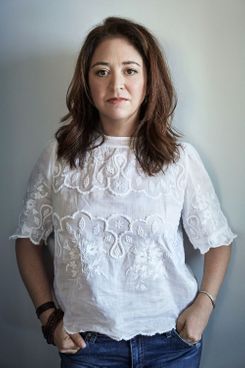
Garbus: You know, I thought it was, but in the past 20 years, only two women have won Oscars for documentaries. That’s 18 men and two women. When I work, I hire women, and I’m around so many wonderful female colleagues who make great films, so I live in a little bit of an illusion. But then, when it comes to awards season, you see people of color and women being weeded out as it gets more and more elite, and that’s very interesting. I do think docs have been more hospitable to women, partially because the budgets are lower. So there’s more willingness to hire women — and that’s a very cynical thing.
Or they just make their own movies.
Golin: That’s what it is, I think. It’s easier to generate the idea in docs, and it’s lower money. So it’s more of an entrepreneurial business than theatrical features.
Garbus: True, but there are many of us who have been doing this for a couple of decades. As those budgets get higher and higher, there are fewer opportunities for women working at the top of our field. In that way, it mirrors the rest of the business.
The writer Mark Harris said something interesting about this, which is that when a man makes a lower-budget film, the industry sees promise and potential, but when a woman makes a lower-budget film, they say, “You found your niche.” Steve, do you find that to be the case?
Golin: I really don’t. It’s interesting to me because there are so many brilliant, successful women producers in this business, and there’s a number of studios that are run by extremely competent, clever women. It’s very difficult to understand why it is the way that it is.
Warren: Well, there’s a disconnect.
Golin: I don’t have the answer for you. I have made about four or five movies with women directors.
Did you hire them personally?
Golin: Yeah.
Berloff: Steve hired me ten years ago, to write a little action movie.
Golin: Yeah. It was a testosterone-driven movie. But I’ve worked a lot with women directing movies —Jodie Foster, Jane Campion, Lorene Scafaria, and probably other people I can’t even remember.
Nagy: I wrote and directed a movie for HBO that was really successful. The difference, Steve, is that there were not a million people knocking on my door to direct another movie. I have seen examples of this happening with men. They do get that interest. I don’t know why.
Golin: And some don’t, you know.
Nagy: Yeah, and some don’t. But it does happen more.
Golin: I’m not saying you’re not right. You probably are right.
Berloff: Leave it at that. [Laughs.]
Golin: The second movie is sometimes a really tricky movie in the director’s career — trickier than the first movie, ironically. It’s very hard to figure out why someone gets momentum and why someone else doesn’t quite get it. But more young men get the first shot, and that’s what’s unfair.
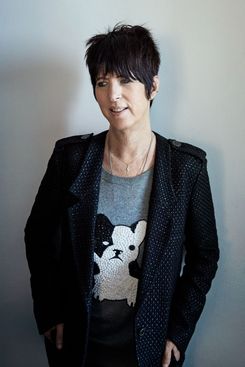
Diane, do you experience that sexism when it comes to your songwriting?
Warren: I’ve never had a problem. Either someone likes the song or they don’t like the song, you know what I mean? But I really can’t stand when someone calls me “one of the most successful female songwriters.” Just call me a songwriter. Sorry, I’m a little egotistical, but I do pretty good — a lot better than a lot of guys do. There shouldn’t be that label with anything — “female director,” “female songwriter.”
Garbus: That’s right.
Berloff: But at the same time, it needs to be discussed, because what this season casts light on are these issues.
Warren: It’s so stupid. You know, in the 1930s, there were more female directors and more female screenwriters than there are now. In the ‘30s!
Vikander: In Sweden, they make more films by female directors. Because I came from such a small country, I thought in my head that Hollywood was going to be a bit different. And I think the big difference is the marketing.
At some studios, the marketing department is like the tail that wags the dog. Studio executives will blame their lack of diverse movies on a perception that nonwhite leads can’t be marketed well to foreign audiences.
Berloff: Except, again, maybe things are starting to change. Take this year — you look at Compton, you look at Creed, you look at Fast and Furious. Those movies made a lot of money for the studio. What it’s going to take is a few brave people, Donna Langley at Universal being one of them, who say, “You know what? We’re going to do this and go for it.” When we tried to get Compton made a few years ago, we couldn’t because they were so worried about this issue. There were no other movies at that budget level without movie stars that they could comp it to. My hope is that, now, that conversation is over. I’m done with that narrative because, you know what? You say these movies don’t travel? That they don’t make money? Now we have comps [comparable movies that set a precedent against which studios can base expectations] to show you. Now we have proof.
Golin: You’re right, everything’s about comps when you’re trying to get a movie green-lit.
What are the comps for The Revenant?
Golin: They were terrible. [Laughs.] I mean, there were no comps. That’s why those guys took a really, really big risk on that. When the movie first opened, the tracking wasn’t that good. The numbers were low, and everybody was flipping out because they could’ve lost a lot of money on that movie. Fortunately, it’s worked out, and they’re going to be fine. But it’s scary. With the amount of money that those movies cost, and the marketing costs on top of it — if it goes wrong, you really lose a lot of money. The alchemy that goes into making a movie is so strange, and the timing changes with the marketplace. A movie that does well today might not do well in six years. But we set out to make good movies and work really hard on them, whether they come out good or bad. I made a movie with Alicia that didn’t work out, The Fifth Estate. It was very painful. That’s just what happens — you try hard, and you never know if it’s going to work.
Phyllis, when you’re working on something like Carol, which you know will be both celebrated and scrutinized by the gay community, what sort of responsibility do you feel?
Cranston: Can I interject? Is it fair to even say that? It’s like what Diane was saying about being a “female songwriter.” Is it fair to put that on the film?
Warren: It’s a legitimate question at the same time, you know?
Nagy: Yeah, it is. I mean, you can’t win. [Laughs.] This is the answer: The film is like a meta-examination of the issue, because there is not one time in the film where sexuality is referred to in that way. It is not about the issue; it is about the pure state of falling in love. But then we are immediately hit with a certain segment that says, “What do you mean? But you’re gay, and you represent us.” And that is also true. I do feel pride in it, in that it’s a very, very good film about gay people. But I would feel that pride no matter what it was about.
What’s your favorite movie of the season that you didn’t have anything to do with?
Vikander: 45 Years. Charlotte Rampling was incredible.
Docter: I liked Spotlight.
Nagy: The Look of Silence, for sure, for sure.
Berloff: I loved Creed. I feel like Ryan Coogler is going to be the guy.
Golin: Oh yeah, he is already.
Berloff: But he’s going to be, like, the Ridley-level guy, is what I mean.
Golin: Yeah, that was a beautifully made movie.
Did everyone get a chance to actually see all the major awards-season movies?
Cranston: I’m still catching up.
Vikander: No, sadly, a lot of them I haven’t seen, still.
Cranston: And you feel the responsibility because you don’t just want to not vote, or vote for the one you saw.
What is something about the voting process that people don’t know?
Cranston: It is reminiscent of a political campaign. You know, we’re talking about awards season, but it’s almost like hunting season. There are targets on people. You’re torn because you want your film to be seen, especially if it’s a little film. You’re proud of it. But there is some compromise that you’re making with yourself. It’s no wonder that you rejoice when you go back to work, and you’re actually on the set.
Warren: I went back to work the morning of the nominations.
Nagy: I actually took a job three months ago, a writing job, specifically to get through this — so I had something else to do.
Berloff: I had a script due yesterday.
Cranston: Was it helpful, the diversion?
Berloff: It was not helpful. I wished I was not doing it. [Laughs.]
Cranston: Never mind, then!
Berloff: I was exhausted, and I was like, “You’ve got to be kidding me, one more scene?”
As you go into the final stretch of the season, how does it feel to know that anything can happen on Oscar night?
Vikander: The only thing we know is that we have no clue.
Bryan, you’ve given a lot of acceptance speeches in the last few years. Any tips?
Cranston: It’s a mistake to think that you don’t have a chance. If you’re nominated, there’s a chance — even though in my category, I am not the front-runner. Leo is.
But you’re here now and he isn’t.
Cranston: I tied him up. [Laughs.] But I think it is important to have something that you would want to say, and it’s an opportunity for you to express yourself, not just about the thank-yous and the help that you got along the way, but about something that’s meaningful, that resonates with you. I don’t think anybody really appreciates the spontaneity of, “Um, oh, oh, God, wow, God, wow, all right. Oh wow, um, um, um, um, um.” Have something in your hip pocket that you’ve thought of, or even just an idea or a direction.
Docter: This year, apparently, they’re doing a thing where you can ahead of time give a list of names so you don’t have to read them. They’ll scroll along the bottom.
Berloff: Is that true?
Nagy: Yes, it is true. It was in my package from the Academy. It’s 80 words. If you email them a list by some point in February — my mother, my sister, my agent — they will scroll it across the screen as you speak.
Cranston: See, that’s how much of a not-front-runner I am. “We told Leo, but we didn’t tell you.”
A version of this article appears in the February 8, 2016 issue of New York Magazine.
